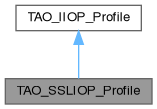#include <SSLIOP_Profile.h>
|
| | TAO_SSLIOP_Profile (const ACE_INET_Addr &addr, const TAO::ObjectKey &object_key, const TAO_GIOP_Message_Version &version, TAO_ORB_Core *orb_core, const ::SSLIOP::SSL *ssl_component) |
| |
| | TAO_SSLIOP_Profile (const char *host, CORBA::UShort port, const TAO::ObjectKey &object_key, const ACE_INET_Addr &addr, const TAO_GIOP_Message_Version &version, TAO_ORB_Core *orb_core, const ::SSLIOP::SSL *ssl_component) |
| |
| | TAO_SSLIOP_Profile (TAO_ORB_Core *orb_core, const ::SSLIOP::SSL *ssl_component) |
| | Create profile with the given SSLIOP tagged component.
|
| |
| | TAO_SSLIOP_Profile (TAO_ORB_Core *orb_core, int ssl_only=0) |
| |
| virtual int | decode (TAO_InputCDR &cdr) |
| |
| virtual int | encode_endpoints () |
| |
| virtual TAO_Endpoint * | endpoint () |
| |
| virtual void | parse_string (const char *string) |
| |
| void | add_endpoint (TAO_SSLIOP_Endpoint *endp) |
| |
| void | remove_endpoint (TAO_SSLIOP_Endpoint *endp) |
| |
| void | remove_generic_endpoint (TAO_Endpoint *ep) |
| |
◆ TAO_SSLIOP_Profile() [1/4]
Profile constructor, same as above except the object_key has already been marshaled.
◆ TAO_SSLIOP_Profile() [2/4]
Profile constructor, this is the most efficient since it doesn't require any address resolution processing.
◆ TAO_SSLIOP_Profile() [3/4]
Create profile with the given SSLIOP tagged component.
◆ TAO_SSLIOP_Profile() [4/4]
| TAO_SSLIOP_Profile::TAO_SSLIOP_Profile |
( |
TAO_ORB_Core * | orb_core, |
|
|
int | ssl_only = 0 ) |
Profile constructor. ssl_only != 0 will force secure connections, pnly.
◆ ~TAO_SSLIOP_Profile()
| TAO_SSLIOP_Profile::~TAO_SSLIOP_Profile |
( |
| ) |
|
|
protected |
Destructor.
Protected destructor to enforce proper memory management through the reference counting mechanism.
◆ add_endpoint()
Add endp to this profile's list of endpoints (it is inserted next to the head of the list). This profiles takes ownership of endp. If endp's iiop_endpoint_ member is not 0, it is added to our parent's class endpoint list.
◆ decode()
◆ decode_tagged_endpoints()
| int TAO_SSLIOP_Profile::decode_tagged_endpoints |
( |
| ) |
|
|
private |
Helper for decode. Decodes TAO_TAG_SSL_ENDPOINTS from a tagged component. Decode only if RTCORBA is enabled.
- Returns
- 0 on success and -1 on failure.
- Note
- This should be enabled only when RTCORBA is enabled, but sadly others pay the price (of footprint) under normal operations.
◆ do_is_equivalent()
◆ encode_endpoints()
| int TAO_SSLIOP_Profile::encode_endpoints |
( |
| ) |
|
|
virtual |
◆ endpoint()
◆ parse_string()
| void TAO_SSLIOP_Profile::parse_string |
( |
const char * | string | ) |
|
|
virtual |
Override parse_string() from the base class to update the SSL endpoint's iiop endpoint once the base class has completed parsing the string.
- Initialize this object using the given input string. URL-style string contain only one endpoint.
◆ remove_endpoint()
Remove endp from this profile's list of endpoints.
◆ remove_generic_endpoint()
| void TAO_SSLIOP_Profile::remove_generic_endpoint |
( |
TAO_Endpoint * | ep | ) |
|
◆ ssl_endpoint_
Head of this profile's list of endpoints. This endpoint is not dynamically allocated because a profile always contains at least one endpoint.
- Currently, a profile contains more than one endpoint, i.e., list contains more than just the head, only when RTCORBA is enabled. However, in the near future, this will be used in non-RT mode as well, e.g., to support
TAG_ALTERNATE_IIOP_ADDRESS feature.
- Since SSLIOP profile is an extension of IIOP profile, its addressing info is contained in two places: IIOP parent class contains all iiop addressing while this class contains SSL-specific addressing additions to iiop. This means that there are two lists of endpoints: one maintained in the parent class and one maintained here. Each ssl endpoint maintains a pointer to its counterpart in the parent class endpoint list.
- For transmission of IIOP addressing information, see
TAO_IIOP_Profile. Addressing info of the default SSL endpoint, i.e., head of the list, is transmitted using standard SSLIOP::TAG_SSL_SEC_TRANS tagged component. See encode_endpoints method documentation above for how the rest of the SSL endpoint list is transmitted.
◆ ssl_only_
| int TAO_SSLIOP_Profile::ssl_only_ |
|
private |
Allways treat this endpoint as secure, even if the constructor did not explicitely specify a tagged component for SSL.
- Most likely the parse_string() will supply a subset of the attributes - port number, for instance.
The documentation for this class was generated from the following files:

